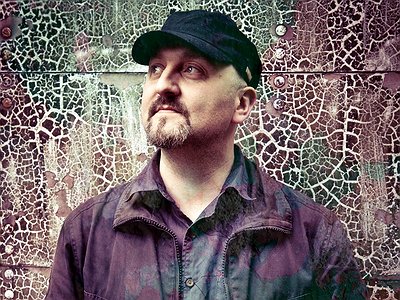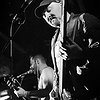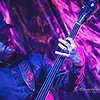Part 1
Name: Colin Edwin
Nationality: Australian
Occupation: Bassist
Current release: Colin Edwin has just released a new album, Once Only, with Eternal Return, a quintet with Paul Godwin, Miguel Noya, Robert Jürjendal and Miguel Toro. It will be out February 23 on New Dog.
Recommendations: Jono Podmore - Jaki Liebezeit: The Life Theory and Practice of a Master Drummer. // Primordial Chaos no16 - Hilma af Klint
If you enjoyed this interview with Colin Edwin, everything you ever wanted to know about him and his work can be found on his personal website.
When did you start writing/producing music - and what or who were your early passions and influences? What what is about music and/or sound that drew you to it?
I started playing the bass at about 15.
Prior to that, although growing up in a very musical household with a father and siblings who all played instruments, I wasn’t particularly interested in playing music. I did eventually find myself listening so much that I wanted to get involved. My father bought me a cheap bass at the suggestion of my mother, and amazingly within a few weeks I met a fantastic London session bass player who, very kindly, taught me a lot of the working skills which have stood me in good stead to this day.
My father played jazz guitar and tried to encourage me in that direction, but I wasn’t ready for it then. I formed a band with some school mates, influenced by things like the Smiths and the Velvet Underground. It lasted a while, and I realised quite soon I really wanted to try and make a “career” out of it. I had so many interesting, fun and fascinating experiences as soon as I started playing that I couldn’t imagine doing anything else, or rather, nothing else was anywhere near as appealing.
I’ve always enjoyed the physicality of playing, the air moving with bass frequencies and also the interaction with other people. There are also moments in live performances during which you are totally in the moment, and completely present and focussed, nothing worries you and the music flows through you and around you, and along with the right audience, you’re part of something bigger than yourself. It’s fleeting though and disappears if you start overthinking, or if your ego gets in the way. I discovered this feeling early on and it was a revelation.
Music being a hard path, I didn’t think I’d ever realistically get anywhere as a bass player. So after a basic course in audio engineering, I tried to become a sound engineer which I felt would be a more stable job. However in the one studio I successfully blagged my way into, I ended up playing in a band with the owner, who was a guitarist.
For most artists, originality is first preceded by a phase of learning and, often, emulating others. What was this like for you? How would you describe your own development as an artist and the transition towards your own voice? What is the the relationship between copying, learning and your own creativity?
It’s a well worn cliche to say that music is a language. But there is a close parallel. As children we learn to speak by copying the sounds we hear and eventually we learn to express ourselves properly, or at least adequately, although some people never get beyond the stage of copying, and remain under the spell of their early influences.
I spent my earlier musical years developing my own bass playing, playing in a few original bands and also learning the usual repertiore of rock / pop / reggae / jazz classics, rather than trying to compose anything. I practiced a lot and got into quite a few different bands and loose situations with different people and the main focus was often adapting and learning to play what I had to in order to work in a group situation.
Other than when I was specifically asked to, I’ve never consciously tried to emulate anyone else, although I certainly learnt to play anything that I either thought might be useful or which appealed to me. I gained confidence in my own ideas only after a very long time in development, and lots of failures. None of us arrive fully formed and it’s tough to expect musicians and artists to be able to work and communicate effectively in their early stages, although there are those that can, of course.
I couldn’t point to one moment but I started to realise that as a bass player, I could find a space in most music that I could carve out for myself, I was able to find and create parts that I considered integral to the whole and which had their own character and made the music work better. I also realised I needed different and challenging contexts to play in, which has driven my desire to collaborate.
What were your main compositional- and production-challenges in the beginning and how have they changed over time?
I’ve always been very much a team player, so initially when it came to creating music on my own, I found it very difficult to develop anything beyond some very basic ideas, and things were mostly left unfinished and abandoned. But I started to see the value of just expressing and creating purely for the sake of it, without any sort of goal, and I would then just return to revise half finished things as and when I felt like it.
I would try and develop ideas but stop as soon it started to feel like a chore, paradoxically this meant I would revisit things more often and I’d develop them much more fully, and in time end up with a finished piece. I now allow myself to just “mess about” - the musical equivalent of sketching I suppose. I’ll come back to the sketches when I’ve more or less forgotten about them and usually find things worth exploring, either on my own or as part of a collaboration.
Production wise I think my decision making has improved a lot, which is a big part of the story, and I’ve got better at all those engineering skills, using the software as well as things like microphone placement, editing and just generally working smarter, problem solving if you like.
I sometimes open old sessions on the computer and think “Why on Earth did I do that?” when looking at things. But it means I’ve been learning all along, which is good.
What was your first studio like? How and for what reasons has your set-up evolved over the years and what are currently some of the most important pieces of gear for you?
After the usual basic cassette four track set up, replaced by a digital 8 track, my first proper studio space was based around a iMac and an early version of Logic. My priority once I had a good set-up was to be able to do remote sessions, so I made sure to get a good DI box and a quality audio interface, then a good microphone to record my double bass or other musicians. I am still a Mac user, and I have comfortable work flow with Logic. But sometimes I like to break the flow by using Reason, which I find really unintuitive and sort of annoying, so it does help shake me up and force me to think differently when I am at loss for what to do.
As for important gear, other than my basses which are all well and truly tried and tested by now, the most important piece of gear at any one time is whatever it is that is inspiring me at the time. It could be a pedal or a plugin I am investigating.







